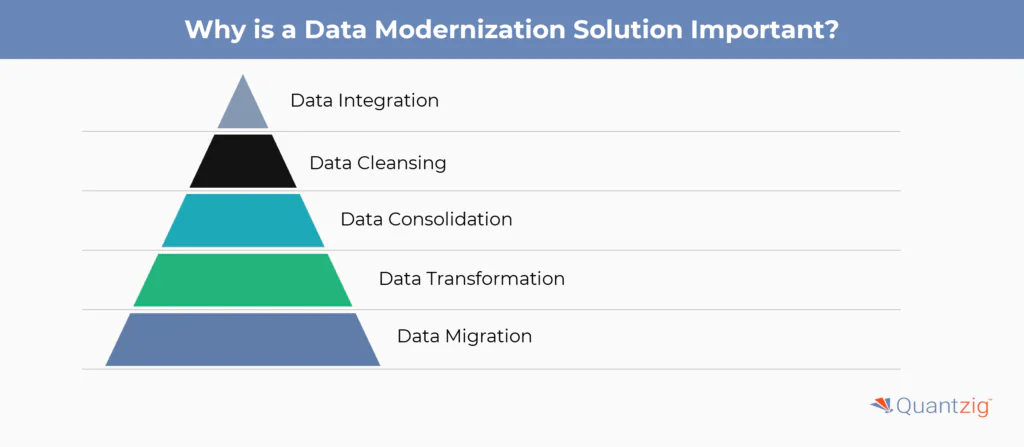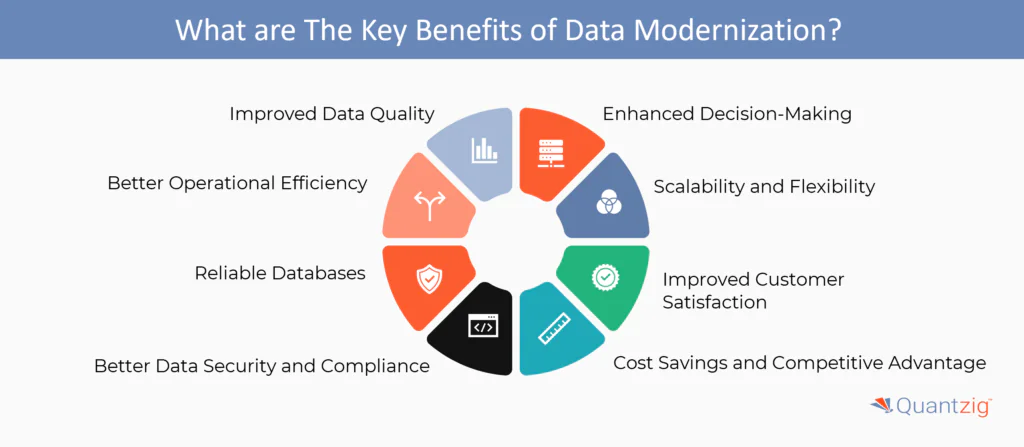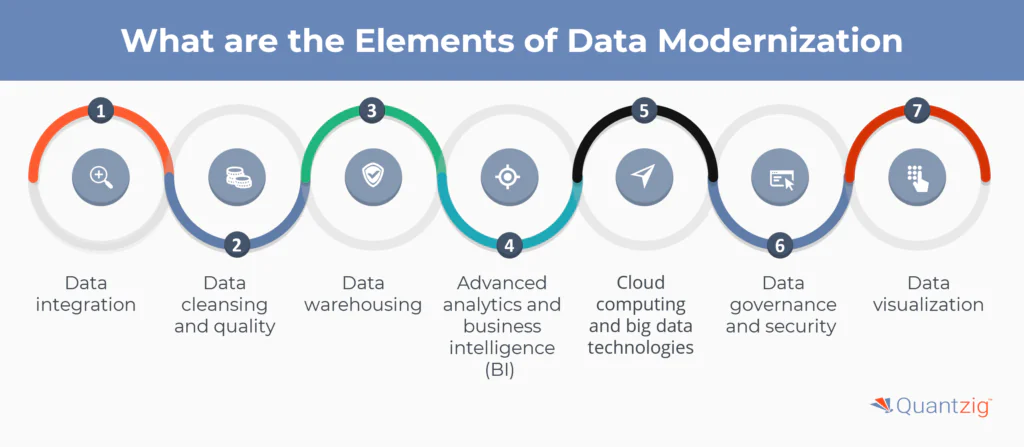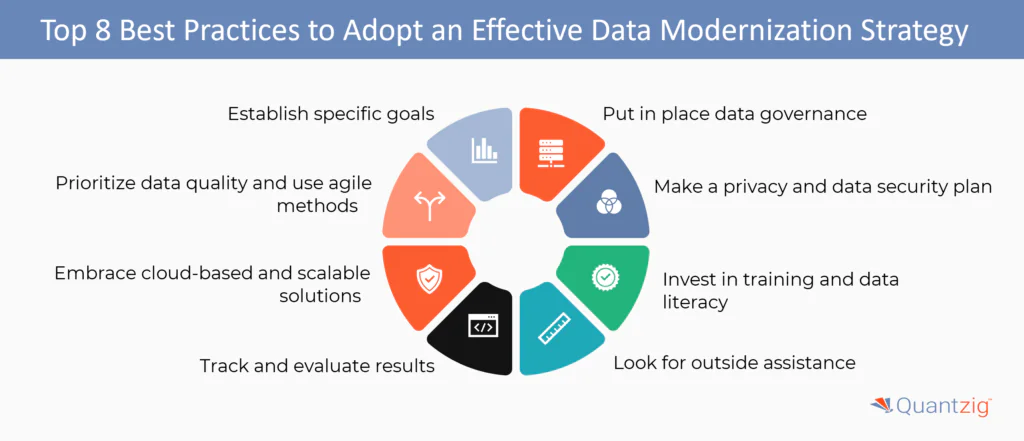Author: Associate Vice President, Analytics and Data Strategy, Quantzig.
Table of Contents
Key Takeaways
- Data modernization is a strategic process that transforms data management capabilities by integrating, cleansing, and analyzing data to drive operational excellence and informed decision-making.
- Data modernization benefits for B2B organizations include improved data quality, enhanced decision-making, better operational efficiency, scalability and flexibility, reliable databases, improved customer satisfaction, better data security and compliance, cost savings, and competitive advantage.
- Data modernization in B2B businesses involves elements like data integration, cleansing, warehousing, analytics, cloud computing, governance, and visualization, enhancing data accessibility and driving business value.
- Quantzig offers a wide range of analytics solutions that include Data Engineering, Data Strategy Consulting, Business Analytics Services, Data Visualization & Reporting, and Business Process Automation.
What is Data Modernization?
Data modernization is a strategic process of transforming legacy data systems, often siloed and fragmented, into a unified, cloud-based ecosystem that leverages modern technologies to enhance data accessibility and utilization. This transformation enables organizations to maximize the value of their data at scale and speed, aligning with the demands of today’s dynamic business environment.
As the requirements of both organizations and customers continue to evolve, B2B businesses are seeking innovative solutions to fulfil and exceed these demands. By providing better ways to store and analyze data, the data modernization process encourages organizations to move away from outdated systems and adopt modern solutions. Thus, before starting this journey, it is essential to create a strong use case for switching to updated solutions and carry out extensive research.
Book a demo to experience the meaningful insights we derive from data through our analytical tools and platform capabilities. Schedule a demo today!
Request a Free DemoWhat is a Data Modernization Strategy?
Data modernization is the systematic process of updating and improving the organization’s tools, practices, and data infrastructure to meet the changing demands of data-driven analytics and business operations, ensuring data is secure, accessible, and properly utilized. The entire process involves adapting contemporary methodologies, tools, and technologies to mitigate the challenges related to outdated data management systems and practices.
Incorporating the found-out benefits of modernizing data systems gained significant traction in the late 2000s and early 2010s when companies started to identify the potential of advanced analytics, big data, and cloud computing. With the advent of technologies like artificial intelligence and machine learning and the exponential growth of data, data modernization has become a critical aspect of staying competitive and leveraging data effectively for business outcomes.
Difference Between Data Modernization and Data Migration
| Aspect | Data Modernization | Data Migration |
| Definition | Updating and transforming data infrastructure and architecture to modern standards and technologies. | Moving data from one system, storage, or format to another. |
| Scope | Comprehensive, involving re-engineering of data management practices and tools. | Specific, focusing on transferring data without necessarily changing its format or use. |
| Objective | Improve data accessibility, scalability, and analytics capabilities. | Ensure data is accurately and securely moved to a new location. |
| Involvement | Includes data migration as a part but also involves modernization of data processing and storage systems. | Standalone process focused on the transfer of data between environments. |
| Outcomes | Enhanced data quality, advanced analytics, reduced costs, and future-proof data infrastructure. | Successful data transfer, minimal disruption to operations, and data integrity in the new environment. |
Why is a Data Modernization Solution Important?
Data modernization is a comprehensive process that encompasses a range of activities designed to optimize data management and unlock its full potential. These activities include:
- Data Integration: Obtaining and consolidating data from multiple sources into a unified platform, facilitating real-time analysis and ensuring seamless data flow.
- Data Cleansing: Fixing errors, eliminating data duplicates, and standardizing formats to ensure data consistency and accuracy, thereby improving decision-making capabilities.
- Data Consolidation: Combining data from disparate sources into a centralized, single repository, allowing for improved data accessibility and streamlined data management.
- Data Transformation: Converting data formats to ensure compatibility across different systems and platforms, enabling efficient data processing and analysis.
- Data Migration: Transferring data from legacy systems to cloud-based, modern platforms, ensuring flexibility, scalability, and improved data security.
Together, these procedures help businesses break down data silos, guarantee consistency and quality, improve accessibility and security, and boost data management effectiveness. Businesses can boost operational effectiveness, stimulate innovation, and make confident decisions based on data by implementing these data modernization techniques.
What are The Key Benefits of Data Modernization?
There are numerous advantages of Data modernization for organizations. By implementing a centralized data strategy, companies can streamline their data management system and improve data accessibility. Modernizing the database and data warehouse optimizes data processing and supports efficient inventory management processes. This transformation enhances the overall customer experience by leveraging analytics and AI for more precise insights.
Some key business data modernization benefits include:
- Improved Data Quality: Data modernization eliminates errors and redundancies, ensuring accurate, up-to-date data for better decision-making and efficiency.
- Enhanced Decision-Making: Access to real-time insights allows businesses to make faster, informed decisions using modern data analytics tools.
- Better Operational Efficiency: Streamlined data processes and automation reduce manual effort, enhancing efficiency and minimizing errors.
- Scalability and Flexibility: Data modernization expands infrastructure to handle growing data volumes and diverse sources, improving integration.
- Reliable Databases: Modern practices ensure data accuracy and reliability, vital for data-driven decision-making.
- Improved Customer Satisfaction: Data modernization enables personalized services, enhancing customer relationships and loyalty as data modernization impact.
- Better Data Security and Compliance: Modern security practices and compliance measures protect data and reduce regulatory risks.
- Cost Savings and Competitive Advantage: Automation and improved data quality reduce costs, driving growth and providing a competitive edge through data-driven decisions.
What are the Elements of Data Modernization?
Data modernization is essential for contemporary B2B organizations looking to optimize operations and drive growth. By integrating key components, companies can fully leverage data to make informed decisions and enhance business processes.
Key Components of Data Modernization for B2B:
- Data Integration: Combining data from multiple sources (CRM, ERP, external APIs) to provide a unified business view, enabling comprehensive reporting and improved decision-making.
- Data Cleansing and Quality: Ensuring data accuracy and reliability by eliminating duplicates, fixing errors, and validating data integrity for actionable insights.
- Data Warehousing: Creating a centralized data repository that supports large volumes of structured data for efficient storage, retrieval, and analysis, forming the foundation for data-driven decision-making.
- Advanced Analytics & BI: Leveraging BI tools and predictive analytics to uncover trends, optimize operations, and drive growth through data-driven insights.
- Cloud Computing & Big Data: Adopting scalable cloud solutions and big data technologies (Hadoop, Spark) to handle unstructured data and process large volumes efficiently.
- Data Governance & Security: Implementing strong governance practices to ensure data privacy, compliance, and security, while defining ownership and access controls.
- Data Visualization: Using visual tools and dashboards to present insights clearly, enabling stakeholders to make quick, data-driven decisions.
By adopting these components, B2B organizations can fully harness the power of their data, driving operational excellence, innovation, and a competitive edge.
Top 8 Best Practices to Adopt an Effective Data Modernization Strategy
Starting a data modernization project requires a strategic approach and adherence to best practices to ensure success. These practices not only streamline the process but also help you achieve cost savings through data modernization and other key benefits:
- Set clear goals: Define specific objectives for your data modernization initiative, such as improved data accessibility and legacy system upgrades. This clarity will guide your strategy and ensure a focused execution.
- Implement data governance: Ensure enhanced data security through robust governance practices. Assign data ownership, define standards, and implement guidelines for streamlined data management and compliance.
- Prioritize data quality and use agile methods: Focus on data quality improvement by using validation, cleansing, and standardization processes. Leverage agile methodologies to break the project into phases, allowing for flexibility and better collaboration.
- Develop a privacy and data security plan: Implement strong security measures like encryption and access controls to safeguard data. This will enhance both data analytics capabilities and overall data security, ensuring compliance with regulations.
- Promote data sharing and embrace scalable cloud solutions: Foster interdepartmental collaboration to create a unified, data-driven culture. Utilize cloud data modernization for scalable data solutions, ensuring flexibility and real-time data insights.
- Invest in training and data literacy: Provide training to boost data literacy, ensuring teams can effectively leverage modernized data and contribute to data analytics capabilities and decision-making.
- Monitor and measure progress: Track success using KPIs to measure real-time data insights and other key outcomes, continuously improving the modernization process.
- Seek external expertise: Partner with consultants for guidance on complex challenges, accelerating your transition to cloud data modernization and optimizing your data assets.
By following these best practices, you’ll benefit from cost savings through data modernization, improved operational efficiency, and scalable data solutions that support your business growth.
Quantzig’s Expertise in Data Modernization Framework for a US-Based Healthcare Retail Brand
| Category | Details |
|---|---|
| Client Details | A leading healthcare, nutrition, and personal care brand based in the United States with annual revenue of $10bn+. |
| Challenges Faced by The Client | The client faced significant challenges in implementing a centralized data strategy due to the disparate data and analytics plans across markets, hindering the integration of data and consistent reporting, ultimately limiting their ability to make informed decisions and achieve commercial excellence. |
| Solutions Offered by Quantzig | The client was able to streamline operations and drive commercial excellence due to Quantzig’s comprehensive data modernization strategy, which included three essential components: Revenue Growth Management (RGM) Core for standardized reporting, RGMx for operational problem-solving, and RGM Insights for holistic decision-making. |
| Impact Delivered | Quantzig’s data modernization solution delivered significant benefits to the client, including: Centralized Data Lake Process Engineering Solutions Intelligence Layers Time-to-Insight Cycle |
Client Details
The client, a leading healthcare, nutrition, and personal care brand headquartered in the USA, has an annual revenue of over $10 billion. The company operates globally, with a presence in over 15 markets.
Challenges in Data Modernization Faced by the Client
The implementation of a centralized data strategy posed notable challenges for the client, impeding their capacity to achieve commercial excellence. Because each market had put in place a unique plan for data and analytics, it was challenging to integrate data between markets and produce consistent reporting. Due to the lack of visibility into global performance data, making informed decisions became difficult.
Data Modernization Solution Offered by Quantzig for the Client
Quantzig, a leading analytics and data science firm, implemented a comprehensive data modernization strategy for the client. The solution consisted of three key components:
- Revenue Growth Management (RGM) Core: This component standardized hundreds of KPIs for uniform reporting and integrated diverse data from platforms, brands, product lines, markets, and geographic areas.
- RGMx: This component utilized low-code or no-code applications to power nodal solutions for operational problems, enabling business users to consume, imagine, and make informed decisions regarding various commercial operations (Pricing, Promo, Execution, Compliance, etc.).
- RGM Insights: This component provided a holistic outlook and drove the right lever at the macro levels through a better understanding of investments, executions, and outcomes.
Impact Delivered Using Quantzig’s Expertise in Data Modernization Strategy
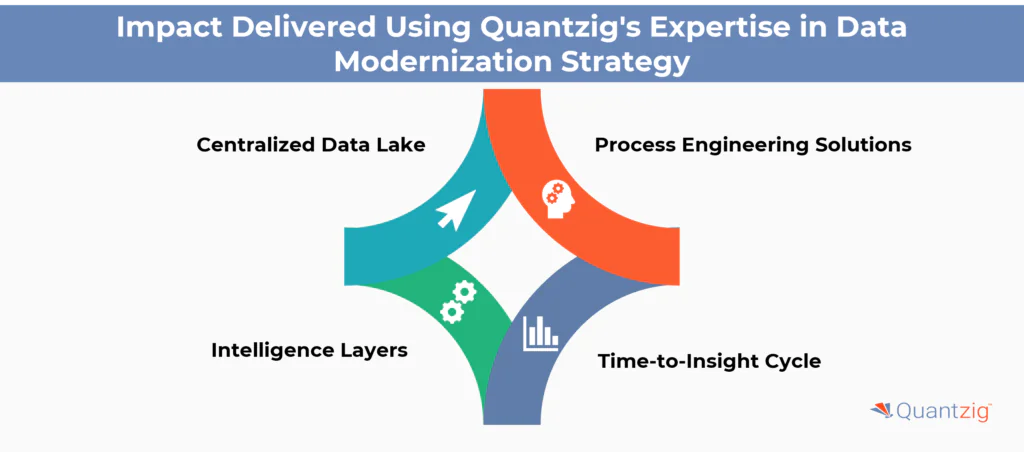
Quantzig’s data modernization solution delivered significant benefits to the client, including:
- Centralized Data Lake: The client gained a centralized data lake, which enabled seamless data integration and analysis across markets.
- Process Engineering Solutions: The client experienced many process engineering solutions (Planning, Simulation, Optimization, etc.) that streamlined operations and improved decision-making.
- Intelligence Layers: The client gained intelligence layers across 15+ markets, providing real-time insights and enabling data-driven decision-making.
- Time-to-Insight Cycle: The time to insight cycle for globalized monthly performance data was significantly reduced, from the third business week to the first business week.
Also Read: How we Helped a US retailer in Standardizing Data, Data Delivery Mechanism, and Tracking Usage
Get started with your complimentary trial today and delve into our platform without any obligations. Explore our wide range of customized, consumption driven analytical solutions services built across the analytical maturity levels.
Start your Free Trial TodayHow Can Quantzig’s Data Modernization Help B2B Businesses?
Quantzig’s comprehensive data management solutions empower organizations to harness the full potential of their data. Their portfolio includes a range of services designed to streamline data infrastructure, enhance accessibility, and ensure data integrity. Key offerings include:
- Data Engineering: Leveraging state-of-the-art industry frameworks, Quantzig simplifies data stacks, optimizing data flow and ensuring data integrity.
- Data Strategy Consulting: Quantzig crafts tailored analytics roadmaps, identifies process gaps, and introduces plug-and-play business acceleration modules to drive sustainable growth and informed decision-making.
- Business Analytics Services: Quantzig specializes in identifying solutions to complex business problems, enhancing performance across the entire value chain, and driving informed decisions.
- Data Visualization & Reporting: Intuitive, three-click visualizations simplify decision-making, providing actionable insights and driving efficiency across the organization.
- Business Process Automation: Custom apps streamline and automate business processes, reducing manual intervention and unlocking substantial time and cost savings.
By investing in Quantzig’s data management solutions, organizations can unlock the full potential of their data, drive innovation, and maintain a competitive edge in the market.
Also Read: What Does Your Business Need to Know About Data Quality Management?
Experience the advantages firsthand by testing a customized complimentary pilot designed to address your specific requirements. Pilot studies are non-committal in nature.
Request a Free PilotConclusion
Data modernization is a critical process that enables organizations to transform and optimize their data infrastructure to meet the demands of today’s rapidly evolving digital landscape. By implementing modern data management tools and technologies, businesses can gain valuable insights, streamline their operations, and enhance their decision-making capabilities. The benefits of data modernization are numerous, including improved data quality, enhanced decision-making, better operational efficiency, scalability and flexibility, reliable databases, improved customer satisfaction, better data security and compliance, cost savings, and competitive advantage. By embracing data modernization, businesses can stay competitive and achieve long-term success.


